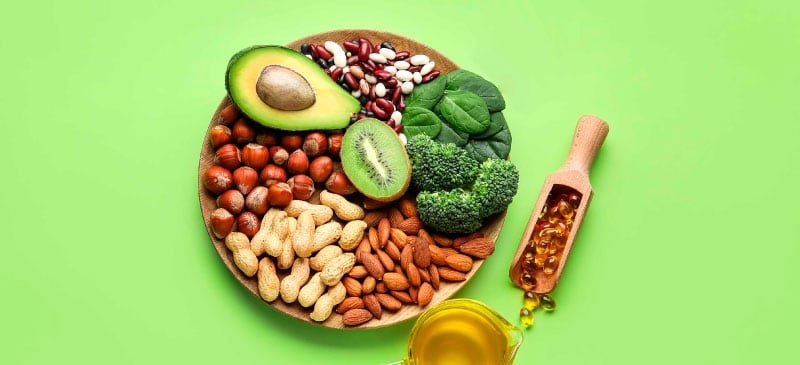Antioxidants are substances that protect your cells from damage caused by free radicals. Free radicals are unstable molecules that can cause oxidative stress, a process linked to various diseases and aging. Antioxidants neutralize these free radicals, helping to maintain cell health and function. This protection is crucial because oxidative stress can lead to chronic inflammation and damage to DNA, proteins, and lipids, which can contribute to health problems like heart disease, cancer, and neurodegenerative disorders.
Incorporating antioxidants into your diet is a simple yet effective way to boost your overall health. They are naturally present in many foods, particularly fruits, vegetables, nuts, and whole grains. By consuming a diet rich in antioxidants, you can support your body’s natural defense mechanisms and improve your well-being. Understanding how antioxidants work and where to find them is essential for making informed dietary choices that enhance your health.
How Antioxidants Work
The Role of Free Radicals
Free radicals are highly reactive molecules with unpaired electrons. They are produced naturally during metabolic processes in the body, such as when cells use oxygen to generate energy. However, external factors like pollution, smoking, and radiation can also increase free radical production. These molecules seek out and damage nearby cells by stealing electrons, leading to a chain reaction of oxidative damage.
This oxidative stress can harm cells, proteins, and DNA, contributing to aging and the development of chronic diseases. Free radicals are involved in inflammatory processes and can disrupt normal cell function, making it essential to manage their levels through antioxidant protection.
How Antioxidants Neutralize Free Radicals
Antioxidants neutralize free radicals by donating electrons without becoming unstable themselves. This process breaks the chain reaction of oxidative damage. Antioxidants can either neutralize free radicals directly or support the body’s own antioxidant enzymes, which help repair damage and prevent further harm.
Vitamins like C and E, as well as minerals like selenium, play a significant role in this protective process. By neutralizing free radicals, antioxidants help maintain cellular health, reduce inflammation, and support overall well-being. Regular intake of antioxidant-rich foods can enhance these protective effects, contributing to long-term health benefits.
Types of Antioxidants
Vitamin C
Vitamin C, also known as ascorbic acid, is a powerful antioxidant that helps protect cells from oxidative damage. It supports the immune system, enhances the absorption of iron from plant-based foods, and aids in the production of collagen, a protein essential for skin health. Citrus fruits, strawberries, bell peppers, and broccoli are excellent sources of Vitamin C. Including these foods in your diet can help maintain healthy skin, support immune function, and improve overall health.
Vitamin E
Vitamin E is a fat-soluble antioxidant that helps protect cell membranes from oxidative damage. It plays a role in immune function and skin health and may help prevent chronic diseases related to oxidative stress. Nuts, seeds, and green leafy vegetables are rich sources of Vitamin E. Consuming these foods can help maintain healthy skin, support immune response, and reduce the risk of chronic conditions.
Beta-Carotene
Beta-carotene is a precursor to Vitamin A and is known for its antioxidant properties. It helps protect cells from damage, supports immune function, and is essential for maintaining healthy vision. Foods high in beta-carotene include carrots, sweet potatoes, and butternut squash. Incorporating these foods into your diet can enhance overall health and support the body’s defense mechanisms.
Selenium
Selenium is a trace mineral that acts as an antioxidant by neutralizing free radicals and supporting the body’s antioxidant enzymes. It plays a crucial role in thyroid function and immune response. Brazil nuts, seafood, and whole grains are good sources of selenium. Ensuring adequate selenium intake can support thyroid health, improve immune function, and provide overall antioxidant protection.
Sources of Antioxidants
Fruits and Vegetables
Fruits and vegetables are rich in antioxidants and provide essential vitamins, minerals, and fiber. Berries, such as blueberries and strawberries, are high in antioxidants like Vitamin C and flavonoids, which help protect cells from oxidative damage. Leafy greens, such as spinach and kale, offer a range of antioxidants, including Vitamin C and beta-carotene. Including a variety of colorful fruits and vegetables in your diet ensures a broad spectrum of antioxidants, contributing to better health and disease prevention.
Nuts and Seeds
Nuts and seeds are excellent sources of antioxidants, healthy fats, and other nutrients. Almonds, walnuts, and flaxseeds are rich in Vitamin E, while chia seeds and sunflower seeds provide a good amount of selenium. These foods help protect cells from damage, support heart health, and provide essential nutrients for overall well-being. Snacking on nuts and seeds or adding them to meals can enhance your antioxidant intake and contribute to a balanced diet.
Whole Grains
Whole grains, such as oats, brown rice, and quinoa, are packed with antioxidants, fiber, and essential nutrients. They contain compounds like phytochemicals that have antioxidant properties and help protect against oxidative stress. Incorporating whole grains into your diet can support digestive health, regulate blood sugar levels, and provide a steady source of energy. Opting for whole grains over refined grains is beneficial for overall health and antioxidant protection.
Herbs and Spices
Herbs and spices not only add flavor to your meals but also offer antioxidant benefits. Turmeric, ginger, and cinnamon are known for their antioxidant and anti-inflammatory properties. These spices can help protect cells from damage, support immune function, and enhance overall health. Adding herbs and spices to your cooking can boost the antioxidant content of your diet and contribute to a flavorful, healthful eating plan.
Health Benefits of Antioxidant Protection
Boosting Immune Function
Antioxidants play a vital role in supporting the immune system by protecting cells from damage and enhancing the body’s ability to fight infections. Vitamins C and E, along with selenium, help maintain a healthy immune response and reduce the risk of illness. A diet rich in antioxidant-containing foods can improve immune function and help the body resist infections and diseases. Ensuring adequate antioxidant intake is crucial for overall health and well-being.
Reducing Inflammation
Chronic inflammation is linked to various health conditions, including heart disease, diabetes, and arthritis. Antioxidants help reduce inflammation by neutralizing free radicals and preventing oxidative stress. Foods rich in antioxidants, such as berries, nuts, and leafy greens, can help manage inflammation and support overall health. Incorporating these foods into your diet can aid in reducing inflammation and improving quality of life.
Supporting Heart Health
Antioxidants contribute to heart health by protecting blood vessels from oxidative damage and reducing the risk of cardiovascular diseases. Vitamin C, Vitamin E, and beta-carotene are known for their protective effects on the heart. By consuming antioxidant-rich foods, you can help lower blood pressure, reduce cholesterol levels, and improve overall cardiovascular health. A diet that includes a variety of antioxidant-rich foods supports heart health and reduces the risk of heart disease.
Enhancing Skin Health
Antioxidants help maintain healthy skin by protecting it from damage caused by free radicals and environmental stressors. Vitamin C supports collagen production, which is essential for skin elasticity and firmness. Vitamin E helps protect skin cells from oxidative damage and supports overall skin health. Consuming antioxidant-rich foods and using skincare products containing antioxidants can enhance skin health, reduce signs of aging, and promote a radiant complexion.
Antioxidants and Chronic Diseases
Role in Preventing Cancer
Antioxidants may play a role in cancer prevention by protecting cells from oxidative damage and reducing inflammation. Compounds like Vitamin C, Vitamin E, and beta-carotene have been studied for their potential to lower cancer risk. While antioxidants alone cannot prevent cancer, a diet rich in antioxidant-containing foods can support overall health and reduce the risk of developing certain types of cancer.
Impact on Cardiovascular Diseases
Antioxidants help protect the cardiovascular system by preventing oxidative damage to blood vessels and reducing inflammation. Vitamins C and E, along with selenium, have been shown to support heart health and reduce the risk of cardiovascular diseases. A diet rich in antioxidants can help manage cholesterol levels, lower blood pressure, and improve overall cardiovascular function, contributing to better heart health.
Benefits for Neurological Health
Oxidative stress is linked to neurodegenerative diseases such as Alzheimer’s and Parkinson’s. Antioxidants help protect brain cells from damage and support cognitive function. Vitamins C and E, along with other antioxidant compounds, may help reduce the risk of cognitive decline and support overall brain health. Consuming antioxidant-rich foods can contribute to better neurological health and reduce the risk of neurodegenerative conditions.
How to Incorporate More Antioxidants into Your Diet
Easy Tips for Eating More Antioxidant-Rich Foods
Incorporating more antioxidant-rich foods into your diet can be simple and enjoyable. Start by adding a variety of colorful fruits and vegetables to your meals, as they are rich in antioxidants. Snack on nuts and seeds or sprinkle them on salads and yogurt for added nutrients. Choose whole grains over refined grains and experiment with herbs and spices to enhance flavor and nutritional content. By making small changes to your eating habits, you can increase your antioxidant intake and support better health.
Sample Antioxidant-Rich Meal Plan
A sample meal plan to boost antioxidant intake might include a breakfast of mixed berries with Greek yogurt and a sprinkle of flaxseeds. For lunch, enjoy a spinach and kale salad topped with cherry tomatoes, almonds, and a lemon vinaigrette. A mid-afternoon snack could be a handful of walnuts or a piece of fruit. Dinner might feature a quinoa and roasted vegetable dish, with a side of steamed broccoli. This meal plan provides a variety of antioxidant-rich foods and ensures a balanced, healthful diet.
Common Myths About Antioxidants
Clarifying Misconceptions
Many misconceptions surround antioxidants and their benefits. One common myth is that antioxidant supplements are more effective than getting antioxidants from food. In reality, whole foods provide a complex mix of antioxidants and other beneficial nutrients that supplements cannot replicate. Another misconception is that consuming antioxidants can prevent all diseases. While antioxidants support health, they are not a cure-all and should be part of a balanced diet and healthy lifestyle.
Understanding the Limits of Antioxidant Supplements
Antioxidant supplements can be beneficial, but they are not a substitute for a healthy diet. Research has shown that taking high doses of supplements may not provide the same benefits as obtaining antioxidants from food. In some cases, excessive supplementation can even have adverse effects. It is best to focus on a varied diet rich in fruits, vegetables, nuts, and whole grains to achieve optimal antioxidant protection and overall health.
Conclusion
In summary, antioxidants play a crucial role in protecting your body from oxidative damage and supporting overall health. By understanding the different types of antioxidants, their sources, and their health benefits, you can make informed dietary choices to enhance your well-being. Incorporating antioxidant-rich foods into your daily diet and debunking common myths about supplements can help you achieve better health and reduce the risk of chronic diseases. Embrace a balanced diet and enjoy the numerous benefits of antioxidant protection.



